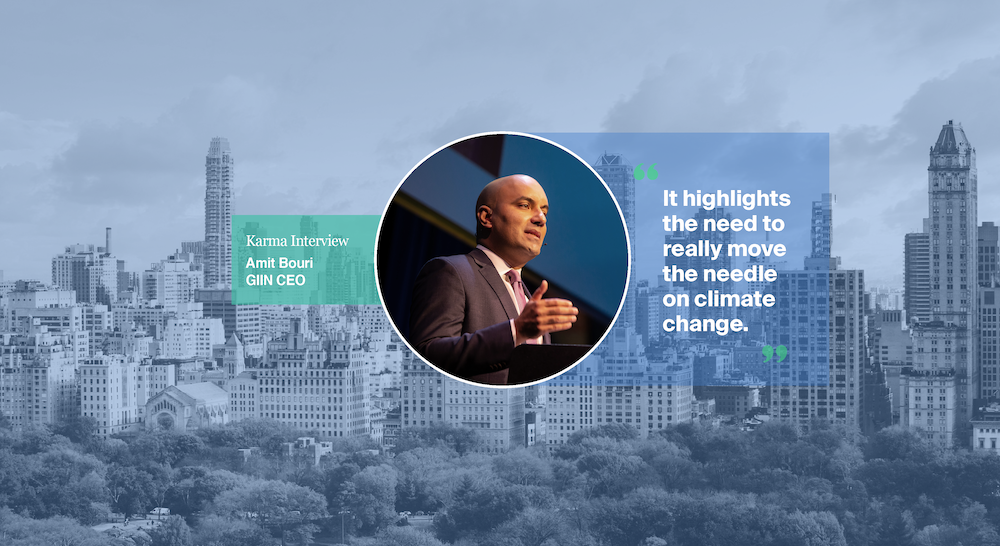- Amit Bouri, the CEO of the Global Impact Investing Network, is racing to support efforts by impact investors to raise capital to combat COVID-19 and create a more sustainable future.
- The virus outbreak has killed over 900,000 people around the globe and highlighted inequalities in healthcare and social justice matters.
- GIIN is part of a movement to reset capitalism.
While the COVID-19 pandemic is ravaging human bodies, parts of the world like California are on fire, possibly due to climate change, which is why Amit Bouri is racing to support efforts by impact investors seeking to raise capital to extinguish the flames of the crisis.
The virus outbreak has killed over 900,000 people around the globe and revealed underlying inequalities in healthcare and social justice matters, while wildfires in the U.S. and elsewhere have highlighted the need to reduce carbon emissions linked to rising global temperatures that may be triggering larger forest blazes says, Bouri, a co-founder and chief executive officer of the Global Impact Investing Network.
Bouri grew up in northern California and remembers being evacuated from school as a child because of massive fires. At times, he was able to look directly at the sun because of the thick smoke that obscured the orb.
Now things are worse, he says.
“To see the sheer volume and magnitude of fires across California and the human impact it’s having, disrupting communities, families, and the environmental impact it is heartbreaking,” Bouri told Karma. “It highlights the need to really move the needle on climate change to make sure that the people who are at the bottom of our socioeconomic structure have more stability and resources because those are the folks that will suffer most.”
In May, Bouri and GIIN partnered with eleven other investor networks and formed the Response, Recovery and Resilience Investment Coalition (R3) to coordinate and support efforts by impact investors to raise capital to address the global emergency.
The New York-based nonprofit along with other groups — including the Aspen Network of Development Entrepreneurs, the Association of European Development Finance Institutions, the India Impact Investors Council and the U.S. Impact Investing Alliance — has organized several co-investment sessions and brought over 300 investors together to evaluate 40 different business opportunities.
Bouri does not have a dollar amount for the capital raised for projects so far but says investors have reported finding good deals and have shown an interest in areas such as food security, agriculture, sanitation, hygiene and healthcare.
“The idea is that we can work on a marketwide basis to engage impact investors and play a role in addressing the crisis through the initial response all the way to the recovery and ultimately build a more resilient system,” said Bouri.
The GIIN’s investment survey released in June showed a growing impact investment market that reached $715 billion in 2019 and significant opportunities for expansion despite the pandemic.
Still, the race to address economic distress and warnings by the U.N. that 130 million people are on the brink of starvation is creating some frustration among investors who are struggling to vet projects as COVID-19 has made it difficult to have in-person meetings.
GIIN released a report this summer with some observations for how investors are making deals in a tough climate. The report says investors are relying on technology to connect and transmit data. People are also loosening old rivalries and sharing information, which is key to breaking a cycle where a lot of investment is going into existing entities in stakeholder portfolios but not original new deals.
“One of the challenges we hear from investors is about conducting due diligence in this environment. This requires investors to adapt the way in which they work,” Bouri told Karma. “And so if one investor has done due diligence, there’s the possibility of sharing that with other investors. That is something that requires a shift like a cultural reorientation.”
This month marks the 50 year anniversary of the Economist Milton Friedman’s essay in The New York Times that said the sole purpose of business is to create profits for shareholders. Yet, the pandemic and global wildfires have shown that the world cannot conduct business as usual, says Bouri.
GIIN is part of Imperative21, a movement to reset capitalism and create a more equitable and sustainable future, kicking off with a media campaign blitz on Sept. 13.
“It’s designed to create a kind of broad-based awareness of the need to build a system that is more inclusive, more successful and better at responding to the needs of a broader set of stakeholders,” said Bouri.






















